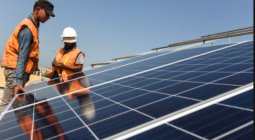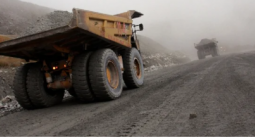Deal reached to boost number of zero-emission trucks and buses on EU roads
EU countries and the European Parliament reached an agreement on Thursday (18 January) on new rules tightening CO2 limits on heavy-duty vehicles (HDVs), paving the way for a significant increase in the number of clean trucks and buses across the bloc.
Under the provisional agreement, which must now be formally approved by the Council of the EU and the European Parliament as a whole, HDV manufacturers must reduce carbon emissions of new vehicles by 45% as of 2030, rising to 65% from 2035 and 90% from 2040.
As the targets are fleet-based, truck manufacturers will continue to be able to produce combustion engine vehicles running on fossil fuels after 2040, but they will comprise a minority of their offerings.
Instead, the vast majority of trucks and coaches sold after that date are expected to be powered by electric batteries or hydrogen, eliminating tailpipe greenhouse gas emissions.
In a change to the European Commission’s proposal, so-called “vocational vehicles”, such as rubbish trucks and cement mixers, will also be subject to the targets, though this will only apply from 2035.
Military and emergency vehicles remain exempt from the standards, as do small-volume manufacturers and HDVs used for mining, forestry and agriculture.
Under the agreement, new urban buses must cut emissions entirely from 2035 – a stipulation that will see diesel-powered city buses permanently phased out. An interim target of 90% was included for 2030.
While buses operating in a single city are required to reduce emissions in line with the legislation, inter-urban buses are exempt from these rules, and instead are subject to the general targets for trucks and coaches.
A controversial proposal championed by Italy and backed by other member states known as the carbon correction factor (CCF) was not included in the final agreement.
Under the CCF, the quantity of green fuels, such as biofuels and electrofuels, in the EU’s fuel mix would count towards CO2 fleet standards.
However, a scheduled review of the legislation to be carried out by the European Commission in 2027 must consider the application of the CCF.
The Commission is also tasked with evaluating the possibility of using a full life cycle assessment for HDVs rather than tailpipe emissions and taking steps towards registering HDVs running exclusively on carbon-neutral synthetic fuels.
Reactions
Greens MEP Bas Eickhout, the lawmaker representing the Parliament in discussions with the Council, said that the passage of the law is “crucial for the climate and our health”.
“Trucks and buses are responsible for 6% of total CO2 emissions in the EU, more than what the whole of the Netherlands emits in total every year,” he said.
“We ideally wanted to completely phase out the combustion engine by 2040, but that turned out to be a bridge too far. Yet I am happy with these goals, because it is a huge acceleration, and the scope of the law has been expanded in the negotiations,” he added.
Christel Schaldemose, the lead lawmaker on the file for the centre-left S&D group, welcomed the outcome, which she said “was not easy” to reach. The deal is “not perfect, but actually good in the current political climate” she wrote on X (formerly Twitter).
However, while the Greens and S&D seem broadly content with the deal, the EPP slammed the outcome, declaring their intention to vote against it at plenary. The deal, according to the EPP’s Jens Gieseke, is proof of socialists’ and greens’ “prohibition ideology”, as it did not include a role for green hydrogen-derived e-fuels.
“Relying only on electric and hydrogen as a type of drive is a missed opportunity,” he said. “Instead we have all eggs in one basket and no back-up plan. That is a gamble on the backs of our industry.”
“Today is a bad day for Europe as an industrial hub,” he added. “We cannot agree with this bad compromise”.
Transport & Environment (T&E), a prominent clean mobility NGO, said the new rules will result in almost a third of trucks sold in 2030 having zero emissions, with at least 75% of HDVs sold in 2040 either electric or hydrogen.
“European producers now have a clear trajectory to ramp up production of electric and hydrogen rigs and be ready for the challenge of Tesla and Chinese rivals,” said Fedor Unterlohner, freight manager at T&E.
The deal is expected to be voted on by the Parliament and Council before April.
Cover photo: A MAN electric truck on the road in Berlin, Germany. [Paceman / Shutterstock.com]





